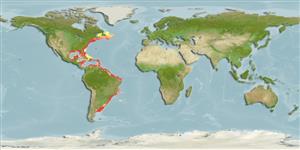Common names from other countries
Lớp phụ Cá sụn (cá mập và cá đuối) (sharks and rays) >
Carcharhiniformes (Ground sharks) >
Triakidae (Houndsharks) > Triakinae
Etymology: Mustelus: Latin for weasel, an ancient name for sharks, possibly referring to the pointed snouts, swift movements and/or rapacious feeding behavior of smaller predatory sharks [strictly not tautonymous with Squalus mustelus Linnaeus 1758 since type was designated by the ICZN]. (See ETYFish); canis: Of islands, referring to occurrence at several Caribbean islands (Cuba, Jamaica, Grand Cayman, Puerto Rico, Nevis Island, Sint Eustatius, the Bahamas and Bermuda), where it appears to be the only species of Mustelus. (See ETYFish).
More on author: Mitchill.
Environment: milieu / climate zone / depth range / distribution range
Sinh thái học
Biển; Thuộc về nước lợ gần đáy; Ở đại duơng, biển (Ref. 51243); Mức độ sâu 0 - 800 m (Ref. 55584), usually 18 - 200 m (Ref. 55309). Subtropical; 46°N - 44°S, 98°W - 31°W
Western Atlantic: Massachusetts to Florida (USA), northern and western Gulf of Mexico, Venezuela, Cuba, Jamaica, Barbados, Bermuda, Bahamas; southern Brazil to northern Argentina; also western Gulf of Mexico and Antilles (Ref. 26938). Northwest Atlantic: Canada (Ref. 5951). Allopatric with Mustelus mustelus and sympatric with Mustelus norrisi. One of the two new allopatric species of canis- norrisi-like smooth-hounds in this region is often confused with this species (Ref. 244). The subspecies Mustelus canis insularis, occurring at several Caribbean islands, was identified by Heemstra (Ref. 27770).
Length at first maturity / Bộ gần gũi / Khối lượng (Trọng lượng) / Age
Maturity: Lm 99.8, range 95 - 100 cm
Max length : 150 cm TL con đực/không giới tính; (Ref. 244); common length : 100.0 cm TL con đực/không giới tính; (Ref. 6077); Khối lượng cực đại được công bố: 12.2 kg (Ref. 40637)
A small, slim shark. Well-serrated dorsal fins, second nearly as large as first (Ref. 26938).
Found on continental and insular shelves and upper slopes, ranging from shallow inshore waters and the intertidal to 200 m, occasionally down to 579 m (Ref. 244). Occasionally found in freshwater. It is doubtful that this species can live in fresh water for an extended period of time (Ref. 244). Active swimmer and bottom feeder (Ref. 27549). Swims in packs or schools (Ref. 27549). Feeds on large crustaceans, mainly crabs, but also heavily on lobsters (Homarus) (Ref. 244). Probably non-territorial. Off the Atlantic coast of the USA, this species is migratory (Ref. 244). Viviparous (with a yolk-sac placenta), with 4 to 20 young in a litter. Longevity given as 7 years (Ref. 775) but appears too low. Utilized fresh, dried-salted, and smoked (Ref. 9987).
Viviparous (Ref. 26281, 35307, 50449), with a yolk-sac placenta; with 4 to 20 young per litter. Distinct pairing with embrace (Ref. 205).
Compagno, L.J.V., 1984. FAO Species Catalogue. Vol. 4. Sharks of the world. An annotated and illustrated catalogue of shark species known to date. Part 2 - Carcharhiniformes. FAO Fish. Synop. 125(4/2):251-655. Rome: FAO. (Ref. 244)
IUCN Red List Status (Ref. 130435)
CITES (Ref. 128078)
Not Evaluated
Threat to humans
Harmless
Human uses
Các nghề cá: Tính thương mại; cá để chơi: đúng
Các công cụ
Special reports
Download XML
Các nguồn internet
Estimates based on models
Preferred temperature (Ref.
115969): 7.8 - 27.5, mean 22.4 (based on 1206 cells).
Phylogenetic diversity index (Ref.
82804): PD
50 = 0.5000 [Uniqueness, from 0.5 = low to 2.0 = high].
Bayesian length-weight: a=0.00195 (0.00165 - 0.00231), b=3.13 (3.08 - 3.18), in cm Total Length, based on LWR estimates for this species (Ref.
93245).
Mức dinh dưỡng (Ref.
69278): 3.6 ±0.2 se; based on diet studies.
Thích nghi nhanh (Ref.
120179): thấp, thời gian nhân đôi của chủng quần tối thiểu là 4.5 - 14 năm (K=0.04-0.43; tm=2-5; tmax=7; Fec= 4-20).
Fishing Vulnerability (Ref.
59153): Moderate to high vulnerability (53 of 100).
Climate Vulnerability (Ref.
125649): High vulnerability (62 of 100).
